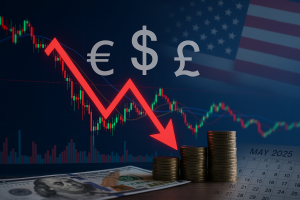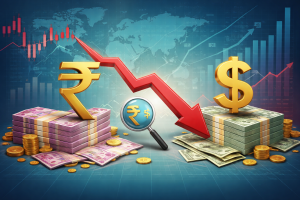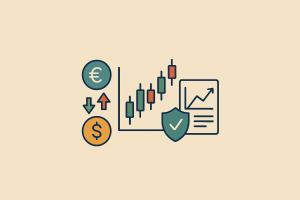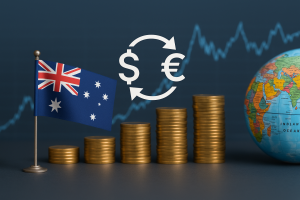Introduction
The global foreign exchange market on August 21, 2025, found itself balancing between two powerful forces. On one side, political tensions in Washington raised questions about the independence of the United States Federal Reserve. On the other, markets waited in anticipation of Federal Reserve Chair Jerome Powell’s highly anticipated speech at the Jackson Hole symposium. The combined effect was a U.S. dollar that drifted without dramatic swings, as traders exercised caution rather than take bold positions.
Political Pressure And Federal Reserve Independence
The role of the Federal Reserve as an independent institution has long been seen as critical to maintaining stability in the U.S. and global financial system. Yet recent political developments have brought this independence under strain. President Donald Trump intensified his criticism of the Fed and its leadership, particularly targeting Chair Jerome Powell and Governor Lisa Cook.
The calls for Governor Cook’s resignation emerged after political figures close to the president raised concerns over her personal mortgage holdings. Despite the allegations, Cook stood firm and publicly rejected the demands to step down. Analysts widely view these attacks as politically motivated rather than a genuine institutional concern. Still, the very fact that such pressure is being applied highlights a broader theme—political encroachment into the central bank’s decision-making.
For decades, the Fed has operated with a reputation of independence, making decisions based on economic fundamentals rather than political direction. If that reputation weakens, it could have long-lasting effects on investor confidence, global reserve allocations, and the stability of the U.S. dollar itself.
The Dollar’s Narrow Trading Range
Despite the noise from Washington, the U.S. dollar index, which measures the dollar against a basket of major currencies, remained broadly steady. It hovered near the 98.30 mark, showing only minor fluctuations throughout the day. Against the Japanese yen, the dollar traded around 147.41, while the euro stood steady at approximately 1.164.
This lack of volatility reveals an important reality: investors are not reacting to political noise with immediate panic. Instead, they are waiting for clarity from the Federal Reserve itself. The muted response underscores the dollar’s role as a global safe-haven currency, even when political uncertainty rises.
Anticipation Ahead Of Jackson Hole
While political developments captured headlines, the real focus for global markets remained the upcoming Jackson Hole symposium. Every year, central bankers, policymakers, and economists gather at this event to discuss the trajectory of monetary policy and broader economic trends. In 2025, the theme “Labor Markets in Transition” provides a backdrop for Powell to address employment trends, inflation, and potential policy adjustments.
Markets currently price in a strong likelihood of a 25-basis-point interest rate cut at the Federal Reserve’s September meeting. Futures data suggest that traders see the probability of a cut as high as 80 percent. Yet minutes from the Fed’s July meeting showed that many policymakers were cautious, preferring to hold rates steady until more data emerged.
The divergence between market expectations and internal Fed discussions sets the stage for Powell’s Jackson Hole address. If Powell confirms dovish expectations, the dollar could weaken further as investors prepare for rate cuts. If instead he pushes back against expectations, signaling a more cautious approach, the dollar could strengthen sharply.
The Politics Of Monetary Policy
The intersection of politics and monetary policy has rarely been more visible. Trump’s public criticism of Powell and calls for reshaping the Fed’s leadership raise questions about how much influence the White House might attempt to exert on central banking.
For global investors, the central concern is institutional credibility. If the Federal Reserve is seen as a political tool rather than an independent body, confidence in U.S. assets could deteriorate. Central banks across the world hold vast reserves in U.S. dollars precisely because of its perceived safety and the integrity of American institutions. If that perception changes, reserve managers could diversify more aggressively into other currencies such as the euro, yen, or even emerging market alternatives.
Global Market Reactions
Outside the United States, financial markets responded in mixed fashion. Asian equity markets offered a varied picture: Japan’s Nikkei fell by 0.6 percent, South Korea’s KOSPI gained nearly 0.9 percent, and Australia’s main index touched new record highs. Chinese blue-chip stocks made modest gains, while Hong Kong’s Hang Seng index held largely flat.
Commodities offered another perspective. Oil prices climbed slightly as inventory data showed stronger-than-expected demand. The Brent benchmark rose near 67 dollars per barrel, while West Texas Intermediate also edged upward. Meanwhile, the cryptocurrency market regained momentum, with Bitcoin rising back above the 114,000 dollar level after recent weakness.
These varied performances suggest a global market environment where investors are positioning defensively. Rather than making bold moves, traders are hedging risks and waiting for Powell’s speech to provide direction.
Risks Of Weakening Fed Independence
Beyond immediate trading patterns, analysts are increasingly discussing the longer-term risks if political pressures weaken Fed independence. Several major investment banks have warned that the forced removal of Powell or any overt political manipulation of the Fed could cause systemic shocks.
In one scenario, U.S. Treasury yields could spike as investors demand higher compensation for political risk, while the dollar could weaken significantly—potentially by 3 to 4 percent in the short term. Such moves would not only shake currency markets but also spill into equities, bonds, and global capital flows.
Some observers even warn of the possibility of a currency war. If foreign governments interpret U.S. political interference in monetary policy as a deliberate attempt to weaken the dollar, they could respond with their own countermeasures, ranging from currency interventions to tariff adjustments.
Investor Sentiment And Reserve Manager Surveys
Recent surveys of global reserve managers highlight these concerns. Nearly two-thirds of respondents expressed unease about U.S. institutional independence, citing political interference at the Fed as a central risk. Some central banks have already begun modest diversification of their reserves away from the U.S. dollar.
Although the dollar remains dominant in global reserves, even small shifts can influence demand. If confidence erodes further, the impact could be far-reaching, reshaping the balance of global finance in ways that echo for decades.
Jackson Hole As A Turning Point
The stage is now set for Jerome Powell’s speech at Jackson Hole. This moment carries heightened importance not only for the trajectory of U.S. monetary policy but also for the credibility of the institution itself. If Powell reaffirms the independence of the Federal Reserve while providing clarity on the near-term path of interest rates, markets may calm, and the dollar could maintain its stability.
On the other hand, if Powell avoids addressing independence directly or delivers a message that diverges sharply from market expectations, volatility could rise sharply. Traders are especially sensitive to the balance between caution and reassurance in his words.
Cross-Asset Perspectives
Looking across markets, the picture is one of waiting and watching. The dollar is steady but fragile. Equity markets show mixed signals depending on region and domestic factors. Commodities point to resilient demand, while cryptocurrencies demonstrate renewed investor appetite for alternative assets.
In this environment, investors are balancing two narratives: the stability of U.S. institutions versus the creeping risks of political influence. Powell’s upcoming remarks may tip the balance, either restoring confidence or deepening unease.
Conclusion
On August 21, 2025, the U.S. dollar drifted within a narrow range, reflecting both its role as a safe-haven currency and the uncertainty that clouds the Federal Reserve’s future. Political pressures in Washington, particularly the calls for changes in Fed leadership, highlight the fragility of institutional independence. Meanwhile, global markets wait for Jerome Powell’s address at Jackson Hole, which could set the tone for monetary policy decisions in September and beyond.
The muted currency movements tell their own story. Investors are unwilling to overreact but are keenly aware that the coming days could reshape expectations. Should Powell affirm independence and provide clear policy signals, stability may return. But should political interference intensify, or should Powell fail to reassure, the dollar and broader financial markets could face turbulence.



